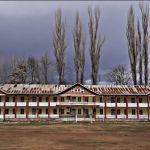A Market Rigged to Rot
In the misty orchards of Kashmir, where apple trees have stood as sentinels of livelihood for generations, a quiet tragedy is unfolding. Once the crown jewel of India’s fruit basket—supplying over 70% of the nation’s apples and a hefty share of walnuts and almonds—Kashmir’s growers are now locked in a David-and-Goliath brawl. Their opponent? Not local rivals, but the subsidized might of American agriculture, backed by a government that’s all too eager to roll out the welcome mat. This isn’t competition; it’s a slaughter.
The Subsidy Sting
Take a stroll through Sopore’s apple belt, and you’ll hear the numbers that haunt every farmer. “I’m selling at ₹58 a pound,” says Ghulam Nabi, a grizzled orchardist with dirt-stained hands and a furrowed brow. “The American stuff? ₹42. How do I fight that?” He’s not wrong. In 2023, the U.S. Department of Agriculture pumped ₹1.3 lakh crore into its farmers, courtesy of the Farm Bill—a cushy safety net that keeps their apples, walnuts, and almonds dirt cheap. Over here? Ghulam’s lucky if he gets a ₹500 handout for a bad season.
The math is brutal. Kashmiri walnuts clock in at ₹125 per pound to produce, almonds at ₹250. American equivalents? ₹100 and ₹210, respectively. That’s a 40% gap for apples alone, widened by fertilizer costs up 40% since 2020, labor wages spiking 20%, and transportation fees that climb faster than a Himalayan goat. “We’re bleeding,” Ghulam mutters, kicking a crate. “They tell us to compete globally, but it’s like racing a Ferrari with a flat tire.”
Delhi’s Gift to Uncle Sam
As if that weren’t enough, India’s policymakers decided to twist the knife. Import duties on U.S. apples slashed from 50% to 20%—a move so tone-deaf it could’ve been scripted in Washington. “It’s betrayal, plain and simple,” says Rifat Bano, a walnut trader in Anantnag, her voice sharp as she sorts through her stock. “I can’t sell at cost and feed my kids. Who’s this policy for—us or American farmers?” She’s got a point. With subsidies already propping up U.S. prices, this tariff cut is less a trade deal and more a charity drive for Yakima Valley growers.
The government’s line? “Adapt or die.” But adapt to what? Selling at a loss? Ditching orchards for desk jobs? “Maybe I’ll grow saffron,” Ghulam quips darkly, “until they subsidize that too.”
Fair Trade’s Big Lie
Free-trade cheerleaders love their buzzwords. “It’s the global economy,” they shrug, as if that excuses the U.S. blowing past its WTO subsidy cap—₹1.6 lakh crore—hitting ₹1.8 lakh crore in 2019 without a peep. India dares to toss its farmers a lifeline? Protectionism! America drowns its growers in cash? That’s just “smart investment.” “The rules only bend one way,” says Dr. Tariq Ahmad, an agri-economist at Kashmir University, shaking his head over a stack of WTO reports. “Our farmers are expected to fight with both hands tied.”
A Fix or a Funeral
Kashmir’s orchard economy isn’t doomed yet—but it’s on life support. Here’s the prescription: Jack import duties to 100%—if America can coddle its farmers, India must shield its own. Pump ₹4,200 crore in direct subsidies to apple, walnut, and almond growers; the U.S. proves cash works, so why not here? Offset 6-8% annual cost hikes with inflation-adjusted relief. And for God’s sake, fund some branding—organic dried apples, premium Kashmiri walnuts—something to claw back market share.
Do nothing, and the endgame’s grim. “I’ll have to sell this land,” Ghulam says, staring at his trees like they’re old friends he’s about to lose. “My father planted these. What do I tell my son?” Across the valley, orchards will wither, expertise will vanish, and frustration will take root where apples once grew.
A Plea in the Orchard’s Shadow
So here we stand, at the crossroads of policy and pride. Kashmir’s apples aren’t just fruit—they’re a lifeline, a legacy, a whisper of home. Delhi must choose: bolster these farmers with tariffs and subsidies, or watch an American flood drown their dreams. Rifat’s defiance rings true: “We don’t want pity—just a fair fight.” The orchards wait, silent and patient. Will the government hear their call, or let them fade into a bitter harvest of neglect?




